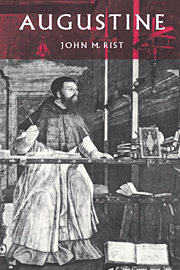Book contents
- Frontmatter
- Contents
- Acknowledgements
- List of Abbreviations
- Works of Augustine
- Notes on chronology
- Bibliographical note
- 1 Approaching Augustine
- 2 Words, signs and things
- 3 Certainty, belief and understanding
- 4 Soul, body and personal identity
- 5 Will, love and right action
- 6 Individuals, social institutions and political life
- 7 Evil, justice and divine omnipotence
- 8 Augustinus redivivus
- Appendix 1 Porphyry's Account of the Sentence in the De-Magistro
- Appendix 2 Traducianism, creationism and the transmission of original sin
- Appendix 3 Augustine and Julian: aspects of the debate about sexual concupiscentia
- Index of modern authors
- General index
7 - Evil, justice and divine omnipotence
Published online by Cambridge University Press: 22 September 2009
- Frontmatter
- Contents
- Acknowledgements
- List of Abbreviations
- Works of Augustine
- Notes on chronology
- Bibliographical note
- 1 Approaching Augustine
- 2 Words, signs and things
- 3 Certainty, belief and understanding
- 4 Soul, body and personal identity
- 5 Will, love and right action
- 6 Individuals, social institutions and political life
- 7 Evil, justice and divine omnipotence
- 8 Augustinus redivivus
- Appendix 1 Porphyry's Account of the Sentence in the De-Magistro
- Appendix 2 Traducianism, creationism and the transmission of original sin
- Appendix 3 Augustine and Julian: aspects of the debate about sexual concupiscentia
- Index of modern authors
- General index
Summary
God judged it better to bring good out of evil than not to allow evil to exist.
(Enchiridion 8.27)BEING AND GOODNESS
In sorting through Augustine's descriptions of man's nature, knowledge, loves and hates, as well as of the harsh and morally disoriented society in which he lives, we have always tried not to lose sight of his insistence on the necessity of a radically theistic explanation of the facts that he has unearthed. In Augustine's view, only a theistic explanation makes sense of the gap between man's aspirations to the good life and the reality of the life he lives. Below the ‘problems’ of man lies the ‘problem’ of God.
Thus far, apart from treating the basic question of arguments for God's existence in chapter 3, and noting Augustine's insistence, against the ‘Greeks’, that creation is from nothing and that thus there is a huge and unique gap between the nature of God and those of his creatures, we have faced the problem of God only indirectly. In finally confronting parts of Augustine's ‘philosophical’ theology head-on, it is easy to begin with the obvious point that – Trinity and Incarnation aside – Augustine's account of God is much indebted to its Platonic or Neoplatonic roots; and Augustine saw something even of the Trinity in Neoplatonic theory. The unchangeable Platonic Forms, in an old tradition, exist in God's mind. Augustine's God too must be unchangeable; he can will change but not change his mind.
As with the God of all Platonists and Christians, there is a sense in which Augustine's God is unknowable (On Psalms 145 (144).6; Sermon 117.3.5).
- Type
- Chapter
- Information
- AugustineAncient Thought Baptized, pp. 256 - 289Publisher: Cambridge University PressPrint publication year: 1994
- 1
- Cited by



